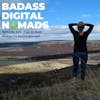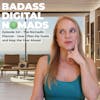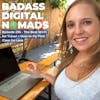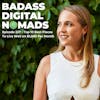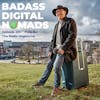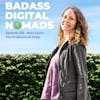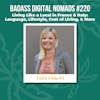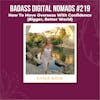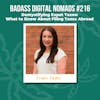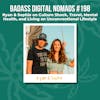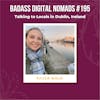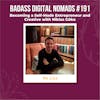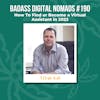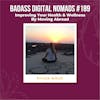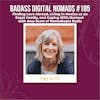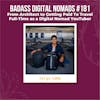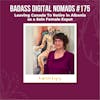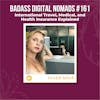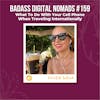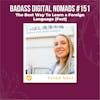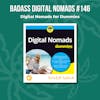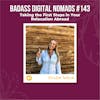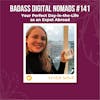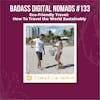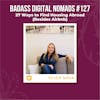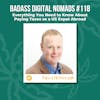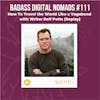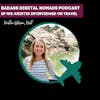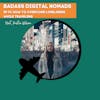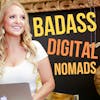From Furniture Salesman to Living in Costa Rica as an Expat and Entrepreneur
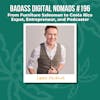
British expat and entrepreneur, Jamie Atkinson, reveals how he went from working as a furniture salesman to living and working online in Tamarindo, Costa Rica.
Get $100 off your first trip with Hacker Paradise. (Referral link)
British expat and entrepreneur, Jamie Atkinson, reveals how he went from working as a furniture salesman to living and working online in Tamarindo, Costa Rica.
He details his journey to becoming a digital nomad and online business owner. He also discloses his cost of living in Tamarindo and shares his candid views on the pros and cons of living in Costa Rica.
At the end of this episode, he gives his top business and sales advice that you can apply to any industry. He also shares how he started, grew, and monetized his podcast.
Jamie Atkinson is such a fun, high-energy guy with tons of business and life experience to share. If you’re an aspiring digital nomad, online business owner, or want to live in Costa Rica someday, this episode is for you!
Episode 196 Special Offers:
- Apply for Kristin’s Ready to Relocate program
- Get $100 off your first trip with Hacker Paradise
- Become a Patreon Patron and support the podcast
- Buy a copy of Digital Nomads for Dummies
- Start earning an online income with the Freelance to Freedom Online Course
- Subscribe to Kristin's weekly newsletter
EPISODE 196 TOPICS DISCUSSED/WHAT YOU’LL LEARN:
- Pros and cons of living in Costa Rica
- Cost of living in Costa Rica
- How much to rent a 3BR apartment in Tamarindo
- How the increased cost of living is impacting crime rates in Costa Rica
- How to boost your productivity and quality of life as an entrepreneur.
- Making friends and building a community abroad.
- Tips for creating work/life balance while working remotely.
- Preparing to become a digital nomad.
- All the ways Jamie tried to make money online before starting a remote online coaching business.
- How to learn new professional skills to increase your income and level up in your career.
- Jamie’s #1 sales tip/skill his team focuses on.
- How to transfer your skills from past jobs to a new career.
- Reasons why people fail at starting a podcast
- How to know if you should start a podcast this year.
- How to monetize your podcast using Jamie’s step-by-step sales framework.
QUESTIONS ANSWERED:
- Why did you leave England and how did you end up in Costa Rica?
- How do you find fast wifi in Tamarindo?
- What is the cost of living in Costa Rica?
- How safe is it to live in Costa Rica as a "gringo"?
- Can you attribute your current business success to your job in furniture sales?
- What are your best tips for being a great salesperson?
- Who should start a podcast in 2023?
- And more!
RESOURCES
Resources for Digital Nomads:
- Send Money Online: Wise (TransferWise)
- Website Hosting: Bluehost
Related Podcasts:
- How To Make Thousands of Dollars per Month Writing on Medium
- How To Live Like a Local Anywhere in the World With Brent and Michael Are Going Places
- Is It Possible To Fully Integrate With a Foreign Culture?
Related Videos:
- 8 Reasons Why Americans LEAVE Costa Rica [Why I Left]
- What the British Think of American Tourists 🇺🇸🤔
- Costa Rica Cost of Living for Foreigners and Expats
- Best Places for Expats To Live in Costa Rica
- How I See the US After Living Abroad for 15 Years [CULTURE SHOCK]
- What I Dislike About Living Abroad After 20 Years in 60 Countries
- The Costa Rica Digital Nomad Visa Explained 🌴🐒
Connect with Jamie:
- Follow him on Instagram
- Connect with him on Facebook
- Listen to High-Ticket Podcast Rebels
- Get featured on Jamie’s Podcast
Connect with Kristin:
- Follow on Instagram
- Subscribe to Traveling with Kristin on YouTube
- Subscribe to Kristin’s weekly newsletter
- Join the Badass Digital Nomads Facebook Group
...........................................................................................
Support the Badass Digital Nomads Podcast:
Relocation Consultation:
Today's episode of Badass Digital Nomads is about living in Costa Rica. And Costa Rica is one of the first places that I ever lived abroad, and it's also the most popular country in the world for my relocation clients. So if you are thinking of moving to Costa Rica and you'd like some help with finding a property or planning your relocation, then send me a message through travelingwithkristin.com/relocation. Tell me a little bit about your plans and we can jump on a phone call and I'll see how I can help. That's at travelingwithkristin.com/relocation.
Introduction: Welcome to Badass Digital Nomads, where we're pushing the boundaries of remote work and travel, all while staying grounded with a little bit of old-school philosophy, self-development, and business advice from our guests.
Kristin Wilson, host: 00:01:04 Hey there, Kristin, from Traveling With Kristin here, and welcome to episode 196 of Badass Digital Nomads. My guest today is British Digital Nomad and entrepreneur Jamie Atkinson, who is also the host of the High Ticket Podcast Rebels Podcast. He's also currently an ex-pat slash digital nomad living in Tamarindo, Costa Rica. In today's conversation, Jamie shares how he went from being a furniture salesman in the UK to being a self-employed location, independent online business owner, living and working remotely in Tamarindo Costa Rica. I dug into some of the details of his cost of living in Costa Rica, some of the pros and cons of living there, and any of the negatives that he's experienced in the last three years of being based there. And we also get into some business advice as well. He has 350,000 hours of sales experience, so he's giving some sales and entrepreneurship tips and also some work-life balance tips as well. I really enjoyed chatting with Jamie today. He is such a high-energy, fun and funny guy with lots of wisdom and business experience, and life experience to back it up. So make sure to check out the show notes for more resources and his podcast, High Ticket Podcast Rebels as well, especially if you're an online business owner or someone aspiring to start a podcast. Enjoy.
Podcast Interview:
Kristin: 00:02:44 Welcome Jamie to Badass Digital Nomads and you are quite a badass digital nomad yourself. So where are you joining us from today?
Jamie 00:02:54 Thank you. That's such a nice introduction. <laugh>, I love being called a badass in any moment. So I'm actually joining from Costa Rica and I'm not sure if I can even call myself a digital nomad anymore cuz I kind of went full ex-pat and I, I've lived here for two years and I've barely done any traveling in the last two years, but I did do three years of travel before that everywhere. So I'm kind of holding onto that moniker. Yeah,
Kristin: 00:03:15 That's fine because my definition of digital nomad is basically just living wherever you want. <laugh>,
Jamie 00:03:22 I definitely do that
Kristin: 00:03:22 Living where you went when you want and working online in some way, shape or form so, or receiving income somewhere. So everyone has their own definition. That's mine. How did you end up in Costa Rica? Was that right before the pandemic then?
Jamie 00:03:37 Yeah, really interesting question. So I was actually in America at the beginning of 2020 and I flew to Italy and then luckily I had a client inside of my podcast program who lived in Italy and she rang me while I was in the airport in Portugal on the connecting flight and she's like, Jamie don't get on the plane to Italy, they're closing the whole place down. So I just skipped my flight and just got off in Portugal and I was like, okay, I guess I better figure out where I'm gonna stay here. And I booked a flight back to the US and we ended up flying back into the US like three hours before the deadline, you know? Wow. So I got super, super lucky. So I actually got stuck in America for like seven months, which was crazy. I couldn't leave.
Kristin: 00:04:15 Where was that?
Jamie 00:04:16 I was in Philadelphia at the time and so I couldn't leave. I was trying to get to Costa Rica and when we were there, the reason that we wanted to get to Costa Rica was I was speaking to a friend and I said to him, I was like, I loved living in Thailand. I love the slow pace, I love the environment, I love the food, I love the hot weather, but the 12 to 13-hour time difference is just a worst thing in the world for me because I can't do any calls and now all my customers were in America. So I was trying to find a Thai vibe somewhere in a better time zone. And so I went all around Europe, I couldn't really find anywhere I liked in Europe, Croatia, Portugal, all these places. And someone said to me, Hey Jamie, I live in Tamarindo, I've lived here for 18 years, you should come check it out. So once finally I could leave America, which ended up being September of 2020, I went to Costa Rica, I was there a week, I was like, I love this place. I signed a one year lease and I've been here ever since. So <laugh>, that's kinda how it happened.
Kristin: 00:05:12 Oh right. Which section of Tamarindo are you in?
Jamie 00:05:16 So right now I live right in the center. I'm in that big horrific iso of a Pacific Park Bill Wheeling, which is the big, horrible, ugly one that everybody hates. But that's where I live right now. Please don't, you know, send any death threats or, or you know, crazy town mail. But that's where I live. And uh, before I lived towards the back of Tamarindo, which I don't know if you know where the old gym is, it was kind of down the back there. So that's my two place.
Kristin: 00:05:38 Yeah. And just before we started talking, I was commenting on your commendable internet speed, which has not cut out whatsoever. And last time I was in Tamarindo was 2017 and there was a hurricane and power outages and I was living living in a house full of poker players and they were all in bad moods cuz the internet cut out all the time and it was a mess. So what's the internet situation there? What's your speed?
Jamie 00:06:07 I believe that's called jinxing it. So we probably will cut out in the next 10 minutes <laugh>. But yeah, it's fairly consistent. So my internet speed here, I think I pay for like a 200 megabit connection. I think it's like 120 megabits. I get probably 20 upload, uh, 120 download pretty much everywhere I've stayed in Tamarindo I've been able to get really fast internet. There isn't really any coworking spaces. There's like one and it's pretty good for internet, but you don't get as much choices with a lot of other places. But honestly, speedwise is great. You get the occasional power outage. So one of my most hilarious things that, that I love about Costa Rica is that I have friends that live all the way over and Playa Grande. Friends that live like an hour south, you know, one one kind of down the coast and whenever there's a power outage, I text all of them and I say, is your power out too?
Jamie 00:06:51 And their answer is always yes. So like it's almost like a quarter of Costa Rica has a power outage at the same time and then it all kind of comes back on again. And someone said to me, he's like, why don't you just get a UPS like one of those little battery packs and I have those. Yeah, they said the problem is it's not my power that goes out, my generator stays on, it's the glim and internet company's power that goes out. So the phone signal disappears, the internet signal disappears, it all just goes down all at the same time. So that does happen sometimes it happens once a day, most of the time it happens, you know, a couple times throughout the week. So we expect that, but most of the time I've been fairly lucky. If it goes off within three minutes it's back on again. So.
Kristin: 00:07:30 Okay, that's good news. And how's your cost of living there at the moment? Like can you give us some data on what you're paying for rent and kind of your monthly greeno cost of living
Jamie 00:07:41 Horrendous <laugh>. I actually text my parents yesterday because one thing I've noticed recently is that the dollar to pound ratio has changed dramatically. And what I mean by this is my rent that right now I pay $2,300. That's very high. Bear in mind I live smack bang in the middle of town. I have a stupidly big three bed apartment.
Kristin: 00:08:00 Yeah, I was gonna say you probably have two or three bedrooms, right? With a view.
Jamie 00:08:03 It's, it's a really nice place. And I ended up coming here because at the time we looked at like 27 properties. I couldn't find anything good for under $2,000 and I was living with my ex-girlfriend at the time and we had a dog and we looked at so many properties I couldn't find anything. And then we eventually stumbled across this place and it was a little bit more than what we wanted to spend, but it kind of had all the amenities and I was like, screw it, we'll just go there. So I actually called to complain about the difference in the pounds. So I pay 2300 rent every month and I pay it through transfer wise. And so it says like, Hey, you know, 1,830 pounds is gonna be the $2,300. And I looked at how much I'd spent in the last five months and five months ago I was spending 1,830 pounds to $2,300. Yesterday when I paid my rent it's 2030 pounds for the same $2,300.
Kristin: 00:08:53 Oh no.
Jamie 00:08:54 So a little bit, little bit of like, you know, inflation with the G B P there. But yeah, I would say that my overall cost of living, it's about probably 2,500 for my place altogether. I'll pay for probably 500 to $600 worth of groceries every month. I tend to pay for a lot of extra amenities as well. So like I have a personal trainer that I work with who's about 750 bucks a month. Sometimes I use like a meal prep company
Kristin: 00:09:17 750?
Jamie 00:09:19 Yeah, he's about 60 bucks for a session. So we do like three a week. So usually Oh okay. It takes me about, you know, a month and then you know, sometimes I'll pay for a meal prep company if I'm just like wanting to be really efficient. And just for context guys, I know this sounds like crazy, crazy expenses. One thing I learned a long time ago, and this has been hugely beneficial for me as an entrepreneur, is that your time is usually worth a lot more than the tasks that you do day-to-day. Hmm. So growing up, my mom cursed me out all the time for the idea of not doing tasks myself. So I grew up being like I was washing my own dishes, I was cleaning my own house, I was doing all of these different things. So when I told my mom I had a maid that was $20 for the entire day when she came and cleaned my entire house and did all my washing, she cursed me out.
Jamie 00:10:03 She's like, why are you being so lazy? And I said, mom, what you've gotta realize is that if I take those same amount of eight hours that I would've been doing all of this cleaning or probably an hour, let's be honest, like I'm not gonna spend that much time cleaning <laugh>, but that same hour that costs me $20 if I go work in my business might be worth a thousand or 3000 or $5,000. So what I do a lot of now when I look at my cost of living is I really analyze all my decisions based on how much is am I gonna get as a return in my business. So for personal training, for example, when I work out all the time, I'm infinitely more productive and I can work for longer. Now I've been doing personal training for two years. So a lot of people are like, well why don't you just pay for the gym?
Jamie 00:10:44 It's 40 bucks. And I say, well if I paid for the gym I would never go <laugh> because I'm lazy. Nick comes and knocks on my door and he is like, let's go. And I'm like, oh. And he's like, come on, let's go. Like he will bully me into working out, but my business has flourished because of that. Yeah. Similarly, if I look at food prep, like there's a meal prep company here where they'll make me five meals a week, two meals each day. So I have a a smoothie in the morning and then they make my two meals for the rest of the day. They might cost me, you know, $800 for the whole month and people will be like, how could you spend $800 on, you know, meal prep food? Well it saves me two hours every day. Yeah. It saves me two hours of shopping, it saves me five hours of making all of the food. And so like across the week I might gain back 10 hours of time. And then I ask the question, well if I have 10 hours of time, could I make back the $200 that I spent this week on food with those 10 hours I regained? So anyway, that's how I like to think through these different processes. I dunno if that's helpful.
Kristin: 00:11:42 Oh yeah. I think of it the same way. I do the same thing and even I'm always looking for ways to get that extra efficiency and I've tried it all of the ways and I'm even when I think back, like years ago when I was living with my ex-boyfriend, I remember negotiating with them to get a maid because I was like, I am not the maid just because I'm the girl, I'm not the maid. We need a maid. And I hadn't been living in Costa Rica for so long, I had a maid three days a week and I was like no, I'm not all of a sudden the one who has to do the laundry and clean the house. No, no, no. So yeah, that's very, very helpful. And when you think about that, like of course you can only be mentally productive a certain number of hours per day, but when you get that extra 10 hours per week, it's like a full day.
Kristin: 00:12:26 that can go to rest and rejuvenation. It can go to getting out and meeting people and having fun and doing stuff or it can go back into the business. But the good news is, is that you get to decide where that time goes so that on your day off you're not spending the whole day running errands, cleaning the house, doing meal prep and like being all stressed out and you can actually enjoy the lifestyle that you have there in Costa Rica. And that's definitely one of the benefits of being in Costa Rica and in some countries that you don't get everywhere. Like how much would meal prep and a maid for eight hours a day be in the UK and a personal trainer would probably be quite a bit more expensive.
Jamie 00:13:06 Totally. Yeah. And so I always like to like try and take advantage of that, you know, as best as possible. You're right. It accommodates for a lot of quality of life, which I think is the key thing is you know, trying to figure out the balance between cost and income and also quality of life.
Kristin: 00:13:20 What are some of the things that you don't really like about Costa Rica? This is a topic that's come up a lot on my YouTube channel and like here and there we've got a lot of controversy over the pros and cons of living in Costa Rica and you're in the sweet spot where you've been there what, two or three years?
Jamie 00:13:36 Yeah, I've been here for just about two years now.
Kristin: 00:13:38 You're not living in the sugar coated right? Fairytale la la land. Like you've seen the reality. So what are some of the downsides?
Jamie 00:13:46 So I think some of the downsides is first of all cost of living. Everybody assumes because it's central America is gonna be cheap and it is not cheap. It's probably just expensive to live here as it is to live in somewhere like the east coast in Philadelphia or maybe not Miami, maybe Miami's a little bit more expensive, but it's more or less the same thing. Food costs the same in the supermarket if not more. Electronics are way more expensive. Yes, having a maid is a bit cheaper but, and by and large most of the time, unless you wanna drive, you know, 20 minutes out into the sticks to find the super cheap, you know, local green grosser, you're gonna pay more or less the same as what it costs to live in America. The benefit, and I say this to everybody, is that most people don't move here to save money.
Jamie 00:14:25 They move here because they want a better quality of life. So that's one of the downsides that most people come in with that expectation and then they move here and they're like, holy shit, this place is expensive. Yeah, it is. The other downside that I see a lot having lived here for a bit longer is actually also one of the benefits. So when I was traveling a lot, I found that the biggest thing that I was missing, and this was like a hole in my heart that could not be plugged, was friendships. Hmm. And I actually had a really hard time even having friendships in the UK. I moved from Shrewsbury where I lived to Birmingham. I was there for a year, I moved to somewhere else. I couldn't really put my roots down and make really great friendships. And then when I traveled for three years, same thing, three months I would move, I would move, I would move.
Jamie 00:15:08 And so my, my big thing that I was seeking and the reason I wanted to stop bouncing around so much was like, ah, I've gotta get like friendships, like local friends. So when I moved here to Tamarindo, it took me about a year and then I started to really make some good friends and now today I walk out my door and like every two meters I will bump into somebody that I know. And it's wonderful. Everybody is in the, cafes knows me. It's like you go to the same places, you know them by name, you see everybody. I just brought my family here and my mom was blown away. She's like, I was terrified that you were alone. And now I feel really good about it because I see how many people are here. But even though that's a benefit, it does tie into the disadvantage, which it is an incredibly small town here.
Jamie 00:15:50 And so yeah, having all of these friends, having all of these people that you know, having all these people that all know each other, you get a lot of gossip. And so one of my pet peeves about this place that drives me up the wall is that there's two types of people that live here. There's the people who are chilling, doing their own thing, working on fitness, doing ayahuasca, whatever they wanna do. And then there's the party people. And the party people go out every single night and every Monday they're screaming karaoke like outside of my balcony and it drives me up the wall. And so typically those party style people are also the gossip people. So over time one of the biggest problems I hear people having as to the reason why they leave Costa Rica, I'd be curious to know what your answer is on this Kristin, but it's because of the too small of a town vibe. Everybody's in each other's business. And that's one of the big pet peeves that I've had. It hasn't affected me too much at this stage, but there's been a couple of situations where I'm just like, dude, like I don't care what you think, like leave me alone. Like I'm gonna live my life.
Kristin: 00:16:45 Yes. I have noticed this is a problem all over the world and it's kind of like the flip side of having friends <laugh>. Like the more friends you have, the more all of a sudden you get brought into the drama of other people's lives. Right. And of course sometimes it's your drama that you wanna talk about too. But yesterday I was on my way to a class and I got stuck on the phone for almost an hour with acquaintance here who was complaining about some stuff and I was just like, man, that was an hour that I could have gone for a walk. Like I could have done some email. Like yeah I just feel like that's kind of wasted time. And one of the things I loved about Costa Rica when I got there was that I didn't have any of that. Like no one knew who I was, right? No one was looking over my shoulder like no like family, friends, accountability. I could just do whatever I wanted. But then the longer you're there, all of a sudden you become part of the gossip, like telephone, coconut wire so to speak. Right. And you're like, wait, I didn't sign up for this. Like I'm just here to live my life
Jamie 00:17:46 <laugh>. Totally. One other thing I wanted to mention really quick, Kristin, and this, this is something that I've noticed and I've heard about this happening in a lot of places, is that specifically in places like San Jose and also in some of the poorer areas here as the cost of living is increasing, one thing that I'm noticing is people are becoming a lot more desperate. There has been an increasing crime. My number one thing that I'm all about whenever I travel is I wanna go somewhere I feel safe. A lot of people are blown away by this, but I'm like, I what's the biggest thing you like about Thailand Jamie? I'm like, it's so safe. And they're like, what are you talking about? No, I'm like, it's the safest place I've ever lived in my entire life. Like you can, yeah, walk through Bangkok in the middle of the night at 4:00 AM completely drunk and completely vulnerable and no one's gonna do anything to you like you know you're gonna be okay.
Jamie 00:18:25 And here, one thing that I've noticed is that it is resoundingly still very safe, but there has been an increase in this sort of petty crime, this desperation, crime, more drug related crime. We just hear about it a lot more nowadays than what you do. And I think the big difference here and and I don't say this to scare anybody, it's really just like if you live in a big city like New York, there's you know, mil probably hundreds of people being killed every night but you just don't hear about it cuz it's a big city when it's a small town, if one person gets shot because of a drug related issue, even though it's some drug dealer somewhere that probably had it come in or whatever. Like you hear about it, you know, around the whole town and it becomes a bit more scary. Yeah. So that's another thing that I've noticed is that as the cost of living is increasing, people are getting a lot more desperate. My friend, somebody broke into his house the other day and stole his mountain bike and we're very like, you know ba, that person probably really needed it. So we kind of let it go. But that's definitely something we are seeing happen more and more.
Kristin: 00:19:19 Yeah, there was a home invasion when I was in Costa Rica in Tamarindo and it was the owner of a hotel and I think it was it his wife too, I would have to Google it and see what happened but I think at least he was killed and stuff was stolen from the hotel. So I'm gonna have to google this now after the episode and make sure I have my facts straight. So I'll drop the link in the show notes.
Jamie 00:19:42 <laugh> fuel in the gossip. I know we talked about that not being good but yeah.
Kristin: 00:19:45 Yeah, I mean that kind of stuff is really, really scary and there's crime everywhere and in Costa Rica too, so Sure. And in Tamarindo, the house I lived in, we had bars on the windows and everything and even then they know how to get the bars off the windows and stuff. So you just don't wanna leave anything valuable like sitting out in planes.
Jamie 00:20:04 Right. And I think for perspective, I'll also tell you like when I lived in England every weekend if we went out to the bar there was probably a 20% chance I was gonna get punched in the face because that's what it's like in England. Like if anybody lives in England, they're gonna be nodding right now. They'll be like, yep, that's how it is, right? Like it's so violent and you know you can avoid those situations but sometimes you can't. You know, I would often take a punch to the face that was meant for my mouthy friend because I lived in England the whole five years that I've traveled and not lived in England. I haven't been in a fight or been in a situation where I'm getting like physically harmed or attacked or anything like that. And so I think for comparison, you know, when we live in America or we live in the uk, you know the violence that you see in your home country typically in these foreign countries, there's nothing like it. It, it's honestly a lot safer. And so I think that's something to be aware of is that even though there is this crime and stuff, you know, if you are smart about it, I've never really had any problems in Costa Rica where I felt unsafe or had any issues. There's been moments where I've been wary and I'm like, ooh that looks like it might be trouble, I'll stay away from it. But by and large I've never had any issues.
Kristin: 00:21:06 Yeah. And it's interesting how like being a male in England, it would be more dangerous for you going out to bars versus if you are like me, like a single female from the US going to England, like that would be much safer to me. <laugh>, no
Jamie 00:21:21 You ain't safe either. The women are the most violent in England, let me tell you. I, I have seen many a woman take off a shoe and beat a woman with it. And bear in mind I come from a super small town in England like called Osworth Street and it's like barely 20,000 people.
Kristin: 00:21:34 Like where is that? Like which part of England is it?
Jamie 00:21:38 Right? It's kind of like on the Welsh border kind of West Midlands. So more or less like an hour away from sort of Birmingham or so. But yeah, it's interesting it's the smaller towns where you see more of the problems.
Kristin: 00:21:48 Oh I haven't been there. It sounds like the wild west.
Jamie 00:21:50 It's, it's crazy people where all they do is they live for the weekends and it's these meatheads or these crazy people who are just like waiting for the weekend to get into a fight because there's nothing better to do. Talk about why I got out of where I lived. Do you know what I mean? Well
Kristin: 00:22:03 That's what I wanted to ask you cuz I was doing a little research and looking at your LinkedIn.
Jamie 00:22:08 Oh God haven't updated that in forever.
Kristin: 00:22:10 <laugh> me neither. But I like to do my research and I saw that you had posted something, I think it was maybe, oh 2016 We're gonna do a blast from the past. I hope I don't embarrass you. Wow,
Jamie 00:22:22 Okay. Maybe.
Kristin: 00:22:22 But this was in 2016 and you wrote that you had been building up your writing portfolio and developing your skills so that as of September of 2017 you could pursue a fully independent lifestyle and work from your laptop anywhere in the world. So yes that was back in 2016, 2017. Can you take us back to that time? What was it about this freedom of this lifestyle that attracted it you to it? What were your aspirations for the lifestyle that you're literally living right now? Right.
Jamie 00:22:55 Well let me tell you, I never dreamed that my business, my life could be anything close to what I've ended up creating. Which is truly really inspirational. You know anybody who's sitting there right now who's saying Man I really wanna be able to make, you know, 1500 bucks online so I can go write articles where your business can go just very, by learning how to do these skillsets will blow your mind to the point where you can literally make millions of dollars and still live the life you want. And so when it was my particular journey in 2016, I was working full-time for a kind of corporate furniture sales company called DFS. If anybody's from England, I'll know exactly what I'm talking about. It's just this huge sofa company. They've always got a sale, it's like DFS half price sale and they're like, well didn't you just run a half price sale?
Jamie 00:23:37 Yes, it's a new one <laugh>. It's exactly the same though. And you know, I had worked seven years in the company and been very ambitious, worked my way up, up, you know, from salesperson to sales manager to managing stores, you know the classic, I'll jump through every hoop to do whatever you want. Yeah. Now I would work six days a week I would travel an hour and a half to get to work and an hour and a half back. And then one day I went and I did my first ever solo trip. I was like man I'm naked, I'm gonna go on a trip. And I, you know, went to Berlin and then I took a train over to go to Prague and then somebody I met in Berlin was like, Jamie, it's Octoberfest come down to Munich. So I like rerouted, went down to Munich, had this amazing experience, incredible trip. Like ended up at Octoberfest drinking beer with these people. I'd met my first ever hostel.
Kristin: 00:24:16 What year was this?
Jamie 00:24:17 2016.
Kristin: 00:24:19 Oh man. I was there the next year. I'm like what if we were there at the same time?
Jamie 00:24:23 Well I actually was there the next year as well. So we probably were there at the same time. Oh we were. Cuz I went back and that was the first thing I did by the way, when I left and I quit to go traveling, the first place I went was Octoberfest actually in September of 2017. So--
Kristin: 00:24:35 I was there.
Jamie 00:24:35 There you go. I probably spilled beer over, you
Kristin: 00:24:38 Probably probably knocked the table over that I was standing on. I still have a knee injury from that <laugh>.
Jamie 00:24:44 So it was this introduction and so from the minute I got back and I landed back in my job, I was telling everybody about this amazing experience and one of my colleagues said to me, wow, I bet you can't wait till next year when you can do that again. And something clicked in my mind and I was like, I do not wanna wait another year to be able to do that. And I went over to the computer and I pulled up my phone pretended I was working and I typed in how to work and travel and that's what I Googled. And they ended up finding a guy called Sean Ogel who later introduced me to something called the Paradise Pack by one of my friends Travis Sherri. And me and Travis are my best friends now.
Kristin: 00:25:17 oh Yeah, I've heard of that.
Jamie 00:25:18 And I took his course. It was the very first course they ever bought and it was how to become location independent. One of them was hey, how to be a freelance writer. So I ended up quitting my job. It was actually a really crazy story. My sister got cancer and I'd just taken a promotion and I went to my boss and I was like, Hey this just happened. It's crazy. She's 29. They say that kidney cancer is super rare in anybody under 60. They're all really confused. We dunno what's going on. I know I just took this promotion but like, can I go back to my other store with my team and everybody who loves me and knows me cuz I'm just not in a mental capacity to take on this promotion right now. And he was like, you got two choices. You can either take the job that you said you would take or you can go back to that other store, but you'll go back as a salesperson.
Jamie 00:25:58 You'll never be a manager in this company again. And there've been so many hoops that I jumped through for years, so much I'd done for this guy and it was just all left by the wayside. And I said to him, I was like, you know what, whatever, gimme two months, I'll be outta the company. That's it. I'm done. And then I was like, shit, what did I just agree to? So I spoke to my mom and she was like, you should go travel. You've been away like 10 times this year already. Like go travel. I was like, all right, are you sure? She's like, yeah. I was like, okay, I'll do it. So then that's, that's what pushed me to go and begin that journey of traveling.
Kristin: 00:26:27 Is your sister okay?
Jamie 00:26:28 She's super good. Yeah. Sorry, I always forget to mention that everybody's on suspends, like what happened to her sister and what happened? Actually after my sister had her surgery to have her kidney removed, she ended up flying to Thailand and we spent three weeks together in Thailand together. And it was this really incredible experience because it's like what happened to her pushed me to be there. Mm-hmm. And we bonded a lot over that and uh, it was really beautiful. So,
Kristin: 00:26:50 Well it kind of all came full circle there. Yeah. And so how did you get by during those first years?
Hacker Paradise
Kristin: 00:26:58 Hey there, Kristin here. If you're thinking of traveling the world but you don't want to travel alone, then why not try a travel community such as Hacker Paradise? With Hacker Paradise, you can meet up with people in the world's greatest destination. So you always have friends in a community with you. The Hacker Paradise Crew goes to places like Bali, Indonesia, Oaxaca, Mexico, Bocas Del Toro, Panama and Cape Town, South Africa. They also go to Columbia, Argentina, Spain and more. To give it a try and get $100 off your first Hacker Paradise trip, use our referral link in the show notes. That's for $100 off your first trip to any Hacker Paradise destination using our referral link in the show notes.
Kristin: 00:27:54 And so how did you get by during those first years?
Jamie 00:27:59 Well, the first thing I did was because I knew I was quitting the company, I sold everything I could for two months and I mean I sold my furniture, I sold my house, I sold everything that I had. I sold everything I could in my job. So I was a salesman. So I was like on the floor every day just working my ass off. So what I did was I got together a lump of money before I left. And what was super terrifying, Kristin was all of the work I put in for seven years, the amount that I had amassed in total after I sold everything was 10,000 pounds. It was about $13,000.
Kristin: 00:28:30 That's still pretty good for being a 20 something now
Jamie 00:28:33 That's a lot. And you're like, okay, that's pretty good. I was 26 at the time. But like also something to kind of understand, it's like in my job I was earning a good amount every single month and I was like, man, that's all I have to show for this. Which was kind of crazy to me, but I basically sold everything, right? My car, everything that that kind of existed. So I had that lump sum of money. And so my goal was very simple. I was going to figure out over the next year how to make money online and if I could make 300 or $400 one month I could dip into my savings and then that saving amount would last me a lot longer. And the second thing I did was I moved somewhere really cheap. So I went to Thailand, right? So I spent three months traveling, went around, you know, Europe a bit and I was like, cool, I'm gonna go to Thailand. It's super cheap there, bootstrap. And I spent around about a year living in Asia, Southeast Asia where it was really, really cheap. But my evolution of what I did for work was kind of crazy. It, it sort of jumped up and and changed pretty quickly
Kristin: 00:29:27 And yeah. So tell people what you do now and then how did you get to this business model?
Jamie 00:29:33 Yeah, so what I do now is kind of interesting. I, I run a podcast coaching business. So I work with six figure and seven figure entrepreneurs. And what we teach them how to do is to install a sales system within a podcast. And so what we do as an outcome is very simple is we help people get on more sales calls with their dream customer. And so I feel really lucky, like I get to work with these incredible entrepreneurs, these incredible business owners, and we do it through teaching them how to do podcasting in this very specific way that that we've sort of figured out over the last three years. And it actually took me about seven failed businesses to get to this point. So I know we don't have enough time to go through the full story animal, but I'll, I'll blast them off real quick.
Jamie 00:30:14 I did affiliate income for a blog blue host I think was it. I made like 300 bucks a month on Blue Host by writing blog articles. I became a freelance writer, then I did a Pinterest course, it failed, nobody bought it. I did an Instagram course, I got to 10 K followers, but it failed. Nobody bought it. Then somebody said, Hey Jamie, this Pinterest course is amazing, but can you just do it for me? I was like, sure, I'll charge you two grand. He's like, great. So then I became a Pinterest agency that went great for six months and then there was an algorithm update and the entire business failed. I was like, maybe I should keep doing an agency. So I did a Facebook ad agency, tried to sell to orthodontist, set up cold callers to call all of these dentist office. None of these dentists trusted me so I didn't make any money. So that failed. Then I started doing funnel building that failed. And then I finally started my own podcast and then I launched a podcast course and that worked. So that's the history of all of the jobs I've had since I became my own boss.
Kristin: 00:31:03 <laugh>, actually one of your partners, I was just on his podcast, he was telling me about Russell Brunson's funnel conference or something. So I was watching the highlight reel of the conference and one of the highlights had Ryan Holiday on stage saying like, maybe your first 10 businesses fail, right? Keep going, start another one. And I was like, that's true. Like they don't tell you that in university they say 98% of new businesses fail or something like that, just so that you go and get a regular nine to five job. They don't say, but then if you keep going then you can be successful on the third one or the seventh one. Sure. Or whatever. They just give you this like doom and
Jamie 00:31:45 Gloom. I always say to people as well, when I look at all of the jobs I'd had, for example, today in my business, I write a daily email and I even consider myself a copywriter nowadays. And a lot of people love the emails that I write. They do really well. They make a lot of sales. The very first freelance job I ever had, I was writing 500 word articles for $16 a pop. And so I wrote 40,000 words a week for like six months and I made about 800 to 1200 bucks a month from doing that. And so that very first job that I got, I say this to people all the time, like it might not have been an amazing business, but it gave me enough money and it taught me a skillset. And that skillset then contributes so that now I can happily charge somebody.
Jamie 00:32:31 I think one guy wanted me recently to do an email campaign for him and he wanted me to, I think he was like saying, okay, I'll give you a cut the profits or whatever it was gonna gonna work out to be about $40,000 for me to just write a five emails for him. But I ended up not doing it because it was gonna take too much time and energy and attention and I wanted to focus on the business instead. And so from like writing $16 articles online about the five ways that you can groom your pet dog or three reasons, sanitation is a terrible choice in your, you know, local city or whatever it might be to then five, six years later, that skillset being worth infinitely more money. The thing I would tell people is that just recognize that you'll massively underestimate what you can do in a 10 year time span, but you think you'll be able to get there twice as quick.
Jamie 00:33:15 So for example, you might think, oh, in the next 10 years I'm gonna build a six figure business, but you think you're gonna get to $5,000 a month within six months. Well the reality is you can probably build a 10 million business, but it's probably gonna take you three or four years before you even hit the ground and get to your first six figures. Mm-hmm. <affirmative>. And so all the time I kind of tell people like if you look at the work that you are doing with a different lens, a different mindset, and think to yourself, well, well what skills am I gaining and how can I stack those skills over time it becomes to the point where your skillset is so strong that it's impossible for you not to make a lot of money because you have sales, you have marketing, you have copywriting, you have all of these things that you'll pick up over time. And so for anybody that's coming in new when they're trying to be a freelancer, that's always something that I kind of remind them of. It's not always about the money you're making from the get-go, it's well, what skill are you gaining and where can that skill take you in the long game?
Kristin: 00:34:11 Exactly. That is amazing advice. And looking at your job history, you have all of those important skills. Writing copywriting, sales is a big one. Can you draw your current business success back from your experience working in the furniture store in sales? And what do you think were the most important skills you developed?
Jamie 00:34:35 A hundred percent. This is something that I always point out to people and Kristin, before you started your own business, was there a role that you were in for years and years? And what was that role?
Kristin: 00:34:45 Right out of college, I went into real estate, which I had no experience doing <laugh>. Okay. So eventually I became really good at selling real estate in Costa Rica. It was very specific skill set that I developed. But then also there's other interpersonal skills and marketing skills and all sorts of other skills that you developed during that time. And I don't think that I would've been able to start my relocation company if I hadn't have worked in real estate in Costa Rica first.
Jamie 00:35:12 Totally. So really great example, and I'll share my example as well. You had a foundational probably years and years of experience in real estate. It doesn't surprise me that the business you ended up flourishing in was a relocation business where a deep understanding of real estate and sales would be very, very beneficial for me. I had a deep understanding from my job of sales, managing sales teams looking for opportunities, building relationships with people in person. And so when my business was created, my podcast business, what makes my podcast business different to every other podcast company that's out there is that what we focus on is the relationship that we build with the interview guest. So just like me and you Kristin, like chatting right now, like we teach people how to build an amazing relationship to connect with somebody, to have an amazing interview. But then also if there's an opportunity where you know that person can help the other person in their business to simply ask, you know, at the end of this interview I might be like, Hey Kristin, you know, we talked a bunch about you know, you and your business and what you're doing.
Jamie 00:36:12 Would you like some help with that? Cuz we were able to figure some of that stuff out. Totally okay if not, but is that something you'd be open to? And if we've done a really good job on the interview and you're like, oh my God, I love Jv, he's amazing. Like he was telling me about all this cool stuff he's done, you're gonna be like, yeah, you know what, why not? Like what have I got to lose? And when you do that enough times, you build a pipeline of sales calls. And so we have this very like soft sales process where it's like, you know what? I don't care whether people say yes or no. We might do 25, 30, 50, a hundred interviews in a week. Like I have a team of people that do these interviews now. We build this amazing rapport, we have this amazing relationship.
Jamie 00:36:48 And then we simply offer, hey, I don't know if you're curious like we're pretty good at this podcast stuff. Do you want some help? And if half of the people say yes, and then 20% of those people say yes again, then we've made 10 sales in that week from those a hundred interviews. And if you sell a $6,000 product, bam, that's $60,000 in a single week. Yeah. And so that entire premise of my business though, it came from my experience of being able to understand sales in a very different way to how everybody else did when I sold in-store, when we sold furniture, we were all about relationship and not about high-pressure sales. I actually have a lot of feminine energy. This is something that people notice about me. They're like, Jamie, you have all girlfriends and no guy friends. I have an abundance of feminine energy probably cuz like my mom and a bunch of people raised me and my dad was in the kitchen all the time working, he was a chef.
Jamie 00:37:36 Oh. And so we brought that skillset that I had in my business into a new environment with podcasting. And so how I created my business was, I said, I kind of love this podcasting thing I'm doing, but I'm not very good at podcasting. I don't have much experience, but what experience I do have is in sales. Hmm. I wonder if there's something that can be merged between the two. And that's where the magic happens is when you merge the two worlds together. So the reason that I share that story is just like you, Kristin, we're like, man, I've got so much experience in real estate and I love this digital nomad thing, but I'm kind of new to it. Like, you know, I haven't done it for years. I wonder if there's something I can do that merges these two worlds together. And wham bam, you create this very unique relocation business that nobody else is offering.
Jamie 00:38:17 And so what I encourage people to think about when they come into this online world and they try and become a digital nomad or an entrepreneur, a lot of people are very tempted to put everything they've ever done behind them. I had a, a person that I worked with a while ago and we were trying to figure out her business and I said, what have you done for the last 10 years? She's like, I've been a personal assistant, a secretary, a crappy job. Like I've got no experience. I'm like, whoa, hold on, let's just take a step back there. Talk me through that. Like what was involved in that? She was like, well, I would help my boss, I would run his schedules, I would do all the meetings, I would manage all the teams. I'm like, that sounds like a really valuable skillset. By the way.
Jamie 00:38:53 How much money was this guy making? Well, the company does like nine figures. Nine figures. So you were the person that was behind the scenes making shit happen for a nine figure business owner. I wonder what happens if you could help people to do that? And she went on to create a coaching business where she helped people understand how to be the integrator, how to be the doer to the other person's vision. And today it's like a massively successful six figure business. And she has a lot of time freedom. So my kind of big takeaway here, I know I've been like talking for ages, but my <laugh>, my big takeaway here is, you know, as you become a digital nomad, as you step into this world, don't forget about all that stuff that you've already got. Ask, how can you marry the two worlds together? How can I take this new thing that I'm super interested in? For you it's digital nomads. For me it was podcasting. And how do I bring my existing skills and experience into that to create something unique?
Kristin: 00:39:43 Yeah. And these are standard skills that can be applied across businesses. So coming from a virtual assistant background, coming from a sales background, marketing, writing, all of these are things that we develop as adults. These are not things that we're born with. These are not things that we learn in middle school or high school. You know, we're learning history and biology and things like that. These are things that you develop in the real world. And everyone that I've ever worked with, they've had a lot of skills too. But sometimes it's hard for people to see their skills as being valuable in other contexts. So I think that's my biggest takeaway from this is first that it takes time to figure out what you're passionate about, what you wanna be doing for work. And there's times that you could fail, then you could run out of money or you could whatever, like things are gonna go wrong.
Kristin: 00:40:36 But then you just start over. And if you have to, you get a job that's under where you think you should be. Like maybe you knew that you could be earning more than $300 a month writing articles, but that's what you were doing to get by at that time. And then you can later turn that skillset into something that could be worth $40,000 to write. Like I know a guy from Medium who started writing for free on Quora and now he has like a multimillion dollar ghost writing agency where he charges like five and six figures to write for people, but he spent a few years just writing for free or for like 2 cents a word.
Jamie 00:41:14 Right? And that's the key thing. I think it's understanding that when you develop these skills, it's about time behind the screen, you know, or whatever you're doing. You know, if you wanna get really good at sales, it's not about taking sales courses, it's about doing a lot of sales. Like I, I said to my team recently, we were on a coaching call and someone said, how much sales experience do you have? Jamie and I did some back in napkin math. And I said, I think I've done over 350,000 hours worth of sales, one-on-ones with people.
Kristin: 00:41:41 Wow.
Jamie 00:41:42 And he was like, holy shit, that's a lot of Time
Kristin: 00:41:45 That's more than 10,000 hours,
Jamie 00:41:47 Right? And I was like, yeah, that's a lot of time. And so that's why I'm pretty good at it is because I've just had a lot of experience. I'm not particularly skilled. I'm, you know, I maybe have some natural, you know, talkative tendencies. Well, I'm actually a very quiet person by nature. When I'm not in the zone of being, you know, the entrepreneur, like I don't do a lot of talking. I sit in the back and I listen. You know? So I think it's important to understand that if you just put in enough time and effort, your skills can grow massively.
Kristin: 00:42:12 What is your number one sales tip that you want your team to focus on that listeners can take Away?
Jamie 00:42:18 My biggest thing, and I say this to my team all the time, is just don't be a dickhead <laugh>. And what I mean by this is like, think about this genuinely, and I mean this genuinely, because there's this thing in sales called commission breath, and it's like when people can tell you're trying to sell 'em, right? It's like, ugh. Like if you take a step back and you stop thinking about yourself and stop being selfish for a second, and you just ask what is in this person's best interest? Try and understand what that is. And how do you understand that? You ask questions, where are you at? What are you trying, what's the struggles? What can you, you know, try and accomplish all of these things and ask them questions and really just try and understand, can I actually help this person? And if you can help that person, tell them why you think you can help them.
Jamie 00:43:04 And so the secret to this is one, you know, having a really good genuine approach where it's not about high pressure sales tactics, it's just about really trying to figure out if you can help somebody and you know, caring about them if you can. And then the second piece is just having belief and conviction in your own process. Now Alex and Mosey talks about this all the time. He says that sales and skills, let's say sales ability, your technique of sales is worth one. Your work ethic is worth one. While conviction is worth two. And what he means by that is like you can have an amazing work ethic, you can have all the sales skills in the world, N L P, the ability to persuade people. But if you just have conviction that your product and your process is going to actually help that person, that's worth double.
Jamie 00:43:51 And so it's the most important thing that you need to focus on when it comes to sales. And you know, he does this really great story where he says, well imagine you go back 10 years in time and you have to convince yourself to buy Bitcoin. You know, and you don't know it's you that's convincing yourself. You've got like a mask on or something. He's like, how would you do it? Would you try and use sales ability? Would you try and persuade that person? No, he would just have utter belief because you've seen it at 30,000 that you're like, oh my God, it's $2 right now. You have to go buy this right now, trust me. Like I fully believe it's gonna go higher. It's like you have to have conviction. So that's my number one sales trip. Big thing is, you know, actually care about whether this is the right thing for them. And then if it is the right thing, have conviction in your process. And here's the thing, this is the number one thing to remember. If you aren't actually convicted in your product and your process, it needs to be made better.
Kristin: 00:44:41 Or sometimes it's not a good fit. Right? Like what I like to think about with sales is that there's all these, this different imagery that can get attached to sales. Like you can think, oh, sleazy car salesman or whatever. But sales to me, it's problem solving. It's listening to what is going on in that person's life and what is the problem that they're trying to solve and can you solve it for them? And if so, then tell them how you can solve it. And if you can't, then find some other resource or recommendation that you can give them to point them in the right direction. And there you had an interaction, that creative value for both people. And So I guess it's having that integrity too, Like you definitely know when people wanna sell you something because they're like, this is the best car in the world, You're like, oh yeah, I really want this economical white car. And they're like, well what about this black luxury car? You're like, I don't need that.
Jamie 00:45:37 It's not what's Right for you.
Kristin: 00:45:38 I want this minivan or whatever. Like, it's like just let the people get what they want,
Jamie 00:45:42 <laugh>. Exactly. Totally agree. So it's just caring about the person and what they want and making sure you're giving them what they actually need. And then just having conviction if you know what your solution is, can help with them. And yet that's my biggest thing that we always drill into our, our teams.
Kristin: 00:45:55 And what have you observed with your podcast clients? So I didn't even know there were that many people starting podcasts that you could get, you know, hundreds of sales calls per month.
Jamie 00:46:06 There Are literally, yeah, millions of them. Which is crazy to think about
Kristin: 00:46:09 Who should start a podcast, should everyone have a podcast?
Jamie 00:46:14 I personally think that it's not for everybody. And we had a conversation about this at the beginning of the call. One of the big things that I see that causes people to not be successful is that they try and do actions that are out of integrity of who they are as a person. So I'll give you an example. I'm a writer, as you've probably just figured out by my conversations earlier. And so writing a daily email is very in alignment with who I am as a person. It's not difficult for me to sit down and want to write something, but if you hate writing and somebody tells you you should go write posts, it'll make you lots of money, it's probably not the right decision, right? And so the number one thing I say to people is, you know, talking to people, connecting with other human beings on a podcast is absolutely perfect for some people and it's a terrible decision for others.
Jamie 00:47:03 So it's all about who you are and whether you can see yourself actually doing the action for the long term. So anybody who says, should I start a podcast? My number one question is, well, if you were gonna do it for two years and not make any money from it, would you still enjoy it? And if the answer is yes, then it probably is something that's in alignment for you. The problem that I see is that 99% of people who start a podcast, who follow the regular advice, go do a podcast, build an audience, get people to listen to it. Most of those people don't make any money. And so that's why we do things differently in our business where we focus on, well, how can we make it actually viable so that you can make money out the gate, you know, making 10, 20, 30, $40,000 out the gate selling one of your offers for your business.
Jamie 00:47:46 And from there we then, you know, evolve it over time. But that's where we really start to focus. So step one, is it actually in alignment for you? Like is it something you could do every day? Cuz not everybody can do 10 interviews with people every single day. If you're an introvert and you hate talking to people, that might suck. That might be the worst business plan in the world. But if you're an extrovert and you love doing interviews with people and it just so happens you might be able to make money from it as well, then it's a really good plan.
Kristin: 00:48:12 Yeah, I would say if it's something that really appeals to you, so if you look at something that you like and you want to do it, but you think you would be really bad at it, it could be something to do anyway because you could be good at it in a year or two. And so your brain is kind of projecting like, I wanna do this thing, I'm gonna suck at it for a while, but like, let's do it anyway cuz later we'll be good. You mentioned of, you know, helping people monetize their podcasts through their offers. So one of the big mistakes I see new podcasters making is that they think they're just gonna build an audience of like a million downloads a month and charge a bunch of money like Joe Rogan for sponsorships and we get rich that way. <laugh> like, it's not really about that, right? How can people make money with, let's say, a podcast that's getting 20 downloads per month or something using your model? What are you guys doing different? And of course people can contact you if they want more info. Yeah,
Jamie 00:49:07 So this is a really good question. So the first thing is, this isn't for everybody. And so the people that we see this work the best for, and therefore these are the only people we work for in our business, is that this typically works very well if you are a business owner that has a validated offer. And what I mean by that is it's something you've sold before. If you've never sold something before, this is very risky because it's like, well you don't even know if you've got something that people will say yes to anyway, right? So we work with those business owners and we typically recommend that this is the best approach for people who sell a higher ticket offer. And so what I mean by that is if you sell a $3,000, $5,000, $10,000 style product, either you know, done for you or a done with you offer, those typically are what this works best for.
Jamie 00:49:53 So just as a precursor, that's who I would recommend this for. You sell a high-ticket product, it's something you've sold before and you already have a podcast. And what we do that's different is that instead of focusing on trying to build download numbers and uh, build a big audience and getting people in our audience to click our link and go to our website and go to a funnel, which all requires a lot of complexity, skill, and all of these things, instead we simply focus on the conversation and the relationship with the people that we interview. So for example, on my show, it's called Six Figure Podcast Rebels. We invite people to come on the show who are six-figure business owners who have a podcast. And the conversation on the show we talk about is, Hey, let's have a conversation about your podcast. How's it going?
Jamie 00:50:37 Is it working well? How does it fuel the business? What were some of your really big wins? Any great stories to share? What were some of the challenges? What do you do in your business to make a lot of sales? So we have a conversation around that. We get them the chance to kind of express themselves and we focus on just building an amazing relationship and doing an interview that they love. And so by the end of it, they're coming out happy. They've had amazing interview, we're promoting that podcast episode, they get featured, they get the authority of being associated with it. And you know, a lot of people who come through our process, we teach them how to get a top 100 podcast, which gives them a lot more credibility, makes it more powerful when people wanna come on the show if you've got a top 100 rating.
Jamie 00:51:17 And then the third piece that we teach people is just the transition, which is just to offer them help. And so I say to people all the time, this isn't about being salesy, it's about asking somebody who probably needs your help if they would like it. And so by attracting the right kind of person to the show who probably needs your help, then when you offer help, they'll probably say yes. And that's it. That's the secret to it. I'll give you an example. If we were gonna do a show for you, Kristin, for your relocation business. So you get people to come on the show who have an interest in moving to Costa Rica to talk about why they wanna move to Costa Rica, what they're excited about, what their challenges are, why they're struggling to find a place. And at the end, after you've built this amazing relationship and amazing rapport, you can say to them, Hey, sounds like you're struggling to find a place in Costa Rica.
Jamie 00:52:05 Right? It's a bit scary doing all of this. Moving from here to there and figuring out the passports and the things. Yeah, it's super scary. We're trying to figure it out there. We're really excited. Would you like some help with that? Ah, yeah, I would <laugh>. Awesome. Well, do you wanna get on another call? I can kind of tell you a bit about how I can work and, and we can just see if I can even help you in the first place. If not, no worries, but if I can, great. And that's it. And so what we'll do is we just focus on having 5, 10, 20 quality conversations with the right people every week. And naturally about half of them turn into sales calls and then, you know, one in five turns into a sale and that's it. That's the entire framework.
Kristin: 00:52:41 Nice. I've actually done that just organically. I've had clients on the show, I've had people just who are podcast listeners on the show who moved to different countries and used my tips and everything. But yeah, it's all about conversations. That's what sales is, conversations with people and you have something, some resource or some ability that helps them solve their problem, right? And that's the beauty of it. And I wish we learned about that at a younger age, but it's never too late to start <laugh>.
Jamie 00:53:14 Right. And I think my final thing to just share is for anybody that's listening, you know, sometimes people can feel like sales is a bad thing. They feel like, oh man, if I get them on the show, am I like doing a bait and switch and trying to sell them something? And at the end of the day, if you're giving them something that's massively valuable just by itself, then they're not gonna feel like that. And it's not like you're trying to force them to do anything. And so you know, when somebody comes through your process, if you can find a way to just naturally give them value, whether they buy or not, then they're not gonna feel upset when you say, Hey, would you like some help with how I can help you? So it doesn't matter if it's on a call or on a podcast or on a Facebook group or whatever it is. If you can try and just give people something valuable that they appreciate being showing up for in the first place, usually that secondary conversation, it's not something they're gonna feel bad about.
Kristin: 00:54:01 Mm-hmm. <affirmative>. And you make new internet friends, right? Like we've been internet friends for years and I'm glad like we finally get to talk. And so many people that come on the show, I feel like I've known them already through Patreon or my Facebook group or through YouTube comments or Instagram. And so it's really great to have you here in person and thanks for sharing your ups and downs and adventures of business in Costa Rica with us. Where can people connect with you to follow your adventures and also get more information about your podcast program?
Jamie 00:54:36 Yeah Guys, so if you wanna learn more about my process, if you are a six-figure or approaching six-figure entrepreneur and you have a podcast and you wanna really figure out how our process works and how we can help you, the best thing you can do is come onto our podcast as a guest. You'll get to see behind the scenes in the entire process. And also at the same time we get to feature you on one of our top 100 shows. So if you wanna come on our show and you will do fit that criteria, you can go to podcastrebels.com. If you're not sure if you fit it, just go on the site, check it out, you'll figure it out pretty quick. And if you wanna find out more about me, what I do, my journey, the best thing is just to hit me up on Instagram. You can find me @JamieAtkinson, j a m i e a t k i n s o n. And yeah, I don't post a lot on social media, but there's some funny stories me messing about on waves or you know, jumping off boats at high altitudes or crazy things like that. <laugh>.
Kristin: 00:55:25 Awesome. Well, thanks Jamie and see you guys next week.
Kristin: 00:55:34 Kristin here. I hope you enjoyed today's episode. And remember, you can get help from me on your upcoming relocation to a new country by going to travelingwithkristin.com/relocation. Or if you wanna take a shorter trip and want to travel with a community of other like-minded people, then you can get $100 off of your first trip with Hacker Paradise by using our link in the show notes. That's all for today, and I look forward to seeing you again next week.

Jamie Atkinson
CEO
Jamie is the founder of The Podcast Profit Accelerator, a coaching business that helps online business owners create 6- and 7-figure podcasts. His goal is to help podcast hosts attract high quality clients day in and day out using a podcast.




























